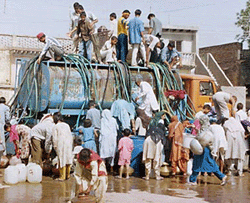| |
A NEW BEGINNING |
|
| By the people |
||
IN FOCUS |
||
| Open letter to the Prime Minister Atal Bihari Vajpayee Khandwa,Catching every droplet The lost pond |
||
CAMPAIGN |
||
| From the courtroom Face to face Destroy, then revive |
||
INITIATIVE |
||
| Woman power Paying up A tiny oasis in Uttar Pradesh Smile! CII’s water meet Rotary’s initiative Brick by brick Nurturing the future CSE’s pilgrims in Madhya Pradesh Taking initiative Experiments with water |
||
NEWS FROM GUJARAT |
||
| Pure
rain In a great hurry! |
||
JAL BIRADARI |
||
| As
priceless as amrit Reviving pynes |
||
JAL YODHA |
||
| D
V Subramanaian Ashutosh Agnihotri |
||
NEWS FROM CHENNAI |
||
| Rain centre inaugurated The Alacrity cycle Porous roads Plumbers’ meet Women’s meet |
||
CSE' LATEST DESIGNS |
||
| Making
a mark in Laburnam |
||
TECHNOLOGY |
||
| Pollutants
to bind roads Make your own rain gauge Smart farming tool Techno tit bits |
||
NEWS FROM ABROAD |
||

| Vol. 4 | No. 4 |
August-September 2002 |
||
| Rainwater
harvesting is catching up in Lucknow "Thank you for the e-version of the newsletter. I am working with the Minor Irrigation Department in Lucknow. It is clear that rainwater harvesting is a positive move for urban areas, where natural process of seepage has been checked due to urbanisation. In Lucknow, it appears every department is keen to do something."Vijendra Pal Minor Irrigation Department vijendra6@satyam.net.in Mumbai’s water group Indymedia group vijaybhangar@hotmail.com Prejudices at societial
level Belgium gedavies@usa.net Well done! Pakistan Environmental programme husein47@yahoo.co.uk "We are interested in Catch Water. Kindly send the same regularly." SKSharma Your responses encourage us. Keep writing!! |
 Looking for water
journalists! Does this picture inspires you to write? We are looking forward for your
stories and information on rainwater harvesting. If published (with due acknowledgment) in
Catch Water, you will receive a CSE publication, as token of our appreciation. Looking for water
journalists! Does this picture inspires you to write? We are looking forward for your
stories and information on rainwater harvesting. If published (with due acknowledgment) in
Catch Water, you will receive a CSE publication, as token of our appreciation. |